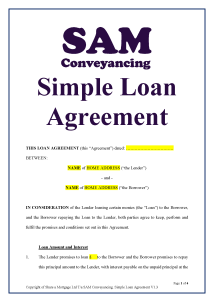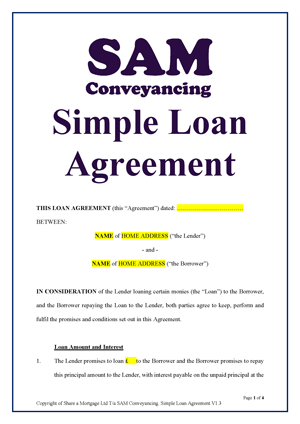Loan Agreement Between Family in 2026
According to the latest research and forecasts from Legal & General and the Centre for Economics and Business Research (Cebr), the "Bank of Family" (formerly referred to as the Bank of Mum and Dad) is expected to play an even more dominant role in the property market during 2026. Based on their most recent reports and projections, here is the data for 2025 and 2026:
Forecasted Lending Data (2025–2026)
- Total Lending Value (2025): Family contributions are set to reach £10 billion annually.
- Total Lending Value (2026): Lending is projected to surge to £11.3 billion in 2026.
- Average Contribution (2026): The average amount gifted or loaned by family members is estimated to hit £29,943 (up from approximately £27,400 in 2024).
- Volume of Transactions (2025): The Bank of Family is expected to support roughly 357,200 home purchases per year by 2025.
The trend for 2026 is that family assistance will help 42% of purchasers under the age of 55. This is why it is critical to have a formal loan agreement in place if the money is a loan, and not a gift. Getting this wrong could leave the lender out of pocket or facing a lengthy, complex legal battle.
A well drafted laon agreement between family can stop this from happening, and ensure the intentions of thge lender and borrower are adequately met.
What is a Loan Agreement, and why is it essential?
A loan agreement is a legally binding contract that formalises a financial arrangement between a lender and a borrower. Unlike a gift, a loan agreement for a property purchase clearly states that the money is to be repaid.
While verbal agreements are technically enforceable in England and Wales, the challenge lies in proving the agreed-upon terms if a dispute arises.
In court, informal loans may be treated as "soft loans", which can leave the lender's money unprotected, particularly in a divorce settlement. Using a formal personal loan agreement ensures the debt is recognised as a legally enforceable liability.
Do I need to notify my mortgage lender?
Yes. If the borrower is getting a mortgage, the mortgage lender must be notified of any private loan, including a family loan agreement.
This is a critical step because some lenders will not allow an additional loan, while others will want to see the formal loan agreement to ensure the borrower can afford the repayments. Our mortgage broker can help you with this matter if you don't already have one to help.
Protect the loan with a registered restriction
Most loans are secured against an asset. If you are lending money for a property purchase, you can secure a restriction against the property's title at the Land Registry.
This restriction protects you, the lender, from the borrower selling the property without paying back the loan. It ensures that the loan is settled when the property is sold.
If you are registering a restriction on a property that has already been purchased, you will need to ask a solicitor to assist.
Warning: If you do not register the loan at the Land Registry, the property can be sold without your loan being settled. While you can still seek settlement, you risk not getting your loan repaid in full and may incur further costs in seeking settlement through the legal system.
Download a loan agreement free from hassle that is legally binding* in England & Wales.
- Instant download in Word and PDF format.
- Suitable for cash loans to friends/family.
- Legally binding.*
- Sign, witness and lend the money.
The templates will be attached to your confirmation email after payment. Please allow a couple of minutes for the email to arrive.

What to include in your Loan Agreement
To ensure your loan agreement is comprehensive and legally robust, it should include the following key details:
- Loan amount, interest rate, and repayment terms (including dates and frequency).
- The full names and addresses of both the lender and the borrower.
- Details of the property and mortgage (if applicable).
- The purpose of the loan (i.e. to fund a property purchase).
- Any security for the loan (e.g. a charge on the property).
The dangers of a generic loan agreement template
It is important to note that a generic loan agreement template is unlikely to be sufficient to protect both parties.
A simple template may fail to account for unique circumstances, could inadvertently fall foul of consumer credit regulations, and may not provide the necessary security.
For this reason, a bespoke agreement drafted by a professional solicitor is highly recommended.
Once the loan is paid off, the lender will need to complete a DS1 form and submit it to the Land Registry to remove the charge.
How much does it cost to register a loan at the Land Registry?
Two costs need to be considered:
- Solicitors' legal fees and disbursements.
- HM Land Registry fees.
Solicitors' legal fees and disbursements
If you are registering the loan as part of the initial property purchase and conveyancing process, your solicitor should only charge a nominal fee for this work.
This is because they are already handling the Land Registry application for the new owner, and the restriction is simply an additional task.
However, if you are registering a loan on a property that has already been purchased and registered, the solicitor's fee will be more substantial. This is because they have to undertake a separate piece of legal work.
The cost for this service typically ranges from £200 to £500 plus VAT, depending on the complexity of the case and whether there is an existing mortgage on the property.
The solicitor will also pass on the cost of essential disbursements, such as obtaining Official Copies of the Title Register and completing ID checks.
HM Land Registry fees
If the loan is registered as part of the initial conveyancing process, there is no additional HM Land Registry fee to pay. The charge is included within the primary registration fee for the property transfer.
If you are registering a loan on a property that has already been registered, a fee will be payable. This is a fixed fee of £20 per title when applying electronically, or £40 per title for postal applications.
The fee is for the application to register a standard restriction, which is the mechanism used to protect your loan.
You should always refer to the government's official guidance for the most up-to-date HM Land Registry charges.
Caragh is an excellent writer and copy editor of books, news articles and editorials. She has written extensively for SAM for a variety of conveyancing, survey, property law and mortgage-related articles.
Andrew started his career in 2000 working within conveyancing solicitor firms and grew hands-on knowledge of a wide variety of conveyancing challenges and solutions. After helping in excess of 50,000 clients in his career, he uses all this experience within his article writing for SAM, mainstream media and his self published book How to Buy a House Without Killing Anyone.









